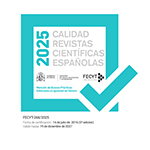Auxilio Social. A space for intergenerational transmission of political commitment during the immediate Spanish post-war
Abstract
This article analyses the political commitments deployed by some women within Auxilio Social, the main welfare institution of Franco’s regime during the immediate post-war period. We will focus, specifically, on the spaces of control that this institution articulated around children and women in the Women’s Social Service. We will also take as an object of study a woman who exercised command responsibilities in the institution: Josefina Sánchez Pedreño, the first provincial delegate of Social Aid in the province of Murcia. With regard to the first case, we will analyse the children’s canteens installed in the urban periphery of the city of Madrid. We will see how these spaces were conducive to the intergenerational transmission of the different political cultures that made up the Republican coalition, at least during the early stages of the post-war period; with regard to the second case, we will take as a reference the life story of Josefina Sánchez Pedreño. We will define her political commitment in Murcia in the 1930s, which drifted from progressive positions to fascist positions, in order to confirm that the possibilities of intergenerational transmission of political commitments were subject to the prevailing gender dynamics in each political culture.
Downloads
Article download
License
Aquellos autores/as que tengan publicaciones con esta revista, aceptan los términos siguientes:
a. Los autores/as conservarán sus derechos de autor y garantizarán a la revista el derecho de primera publicación de su obra, el cuál estará simultáneamente sujeto a la Licencia de reconocimiento de Creative Commons Reconocimiento-No comercial-Sin obra derivada 4.0 España que permite a terceros compartir la obra siempre que se indique su autor y su primera publicación esta revista.
b. Los autores/as podrán adoptar otros acuerdos de licencia no exclusiva de distribución de la versión de la obra publicada (p. ej.: depositarla en un archivo telemático institucional o publicarla en un volumen monográfico) siempre que se indique la publicación inicial en esta revista.
Plagio y fraude científico
La publicación de un trabajo que atente contra los derechos de propiedad intelectual será responsabilidad de los autores/as, que serán los que asuman los conflictos que pudieran tener lugar por razones de derechos de autor. Los conflictos más importantes pueden darse por la comisión de plagios y fraudes científicos.
Se entiende por plagio:
1.Presentar el trabajo ajeno como propio.
2.Adoptar palabras o ideas de otros autores sin el debido reconocimiento.
3.No emplear las comillas u otro formato distintivo en una cita literal.
4.Dar información incorrecta sobre la verdadera fuente de una cita.
5.El parafraseo de una fuente sin mencionar la fuente.
6.El parafraseo abusivo, incluso si se menciona la fuente.
Las prácticas constitutivas de fraude científico son las siguientes:
1.Fabricación, falsificación u omisión de datos y plagio.
2.Publicación duplicada.
3.Conflictos de autoría.












